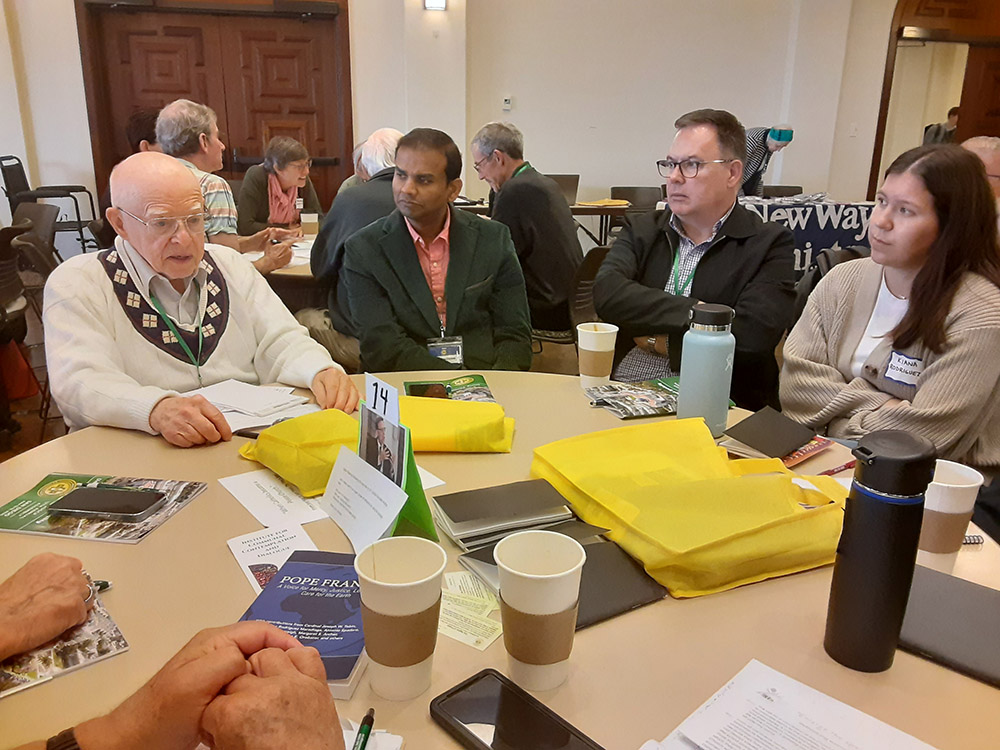
Attendees of the annual assembly of the Association of U.S. Catholic Priests discuss their ministry in the context of synodality during a table discussion on June 14 at the University of San Diego. (Dennis Sadowski)
It was a most welcome surprise to work with the Association of United States Catholic Priests recently. There has been such public resistance among a certain group of bishops and laity to Pope Francis' vision and the reluctance to embrace the spirit of synodality, that to gather with close to 200 priests from around the country to explore unity through synodality was a needed shot in the arm.
These men who continue to minister within the spirit of the Second Vatican Council take Francis' vision seriously and have chosen contemplative dialogue as their process for when they gather in their annual assembly.
This year, I had the privilege to lead their day retreat and opening prayers throughout the week. My theme was "Responding from a Contemplative Heart: Living Synodality in a Polarized World."
Each day began with a contemplative sitting, consenting to God, Divine Love, working within us for our transformation and that of the world. The 10 minutes of stillness created an atmosphere that welcomed the different ideas and positions that would be encountered throughout the day.
The final day of the assembly created a unique opportunity to put this into practice.
To truly encounter another who is different from you or who holds differing views is not an easy task. Yet, it is only in that vulnerability and openness to the other that understanding and transformation occurs.
Dr. Cecilia González-Andrieu, professor of theological studies at Loyola Marymount University, addressed the assembly. Her address was "Bridge People or Neglected and Peripheral?: Latina/Latino Catholics in the U.S." Her address was well-received, but what followed was a gift to all of us.
Working with the leaders of the organization Discerning Deacons, she invited about 40 local women from San Diego, where the assembly was held, to join with the men that morning. Women joined the men at the tables, and within the context of contemplative listening, each shared their responses to the following questions: Why am I in ministry? Why am I doing this work? Where do I find the fire to keep going?
The context to listen to those who differ had been set the previous days as the men sat in contemplative silence and attentively listened to themselves and to the speakers. This morning, clerics and laywomen engaged as equals and shared in depth the motivation for their ministry, even when many of the women's desires are yet to be legitimated by the official church.
The energy in the room was palpable. The conversations were lively. The spirit of synodality prevailed. Many responded hoping that this could be replicated throughout the country in every diocese.
Advertisement
I believe this is what synodality calls us to. As the Working Document for the Continental Stage of the synod says, "A synodal spirituality can only be one that welcomes differences and promotes harmony, and draws from the tensions the energies to continue on the journey."
To truly encounter another who is different from you or who holds differing views is not an easy task. We see that in the growing divisions within our country and our church. We become convinced of our own position or belief and consciously or unconsciously defend it, fearing that change may make us look weak or unprincipled or demand of us more than we are willing to give.
Yet, it is only in that vulnerability and openness to the other that understanding and transformation occurs.
How we foster that spirit within ourselves is for me rooted in contemplation. I believe the future that is emerging invites us to encounter deeply held assumptions, biases, beliefs and worldviews in ways we have not known previously and for which we are not skilled.
The work of the Institute for Communal Contemplation and Dialogue invites that deep listening to God, to oneself and to the other, grounded in a contemplative practice.
There are few, if any road maps for this emerging future. But I have often pondered the process by which the early church agreed to change the belief and practice that all Gentiles be forced to convert to Judaism before being baptized and to follow the law of Moses.
In Acts 15, it is written that the elders and apostles came together to hear advocates for the different positions. They celebrated all God had accomplished through the work of those men sent to Antioch to preach the good news to the Gentiles. They agreed to discuss this issue more thoroughly.
Peter posed a question to those assembled: "Why, then, do you put God to the test by trying to place on the shoulders of these converts a yoke which neither we nor our ancestors were able to bear?" Then the assembly fell silent.
They continued to listen to each other. James articulated what he felt was the sense of the whole: that they would not make it more difficult for Gentiles who are turning to God. The entire assembly decided to accept what James recommended.
I see within this narrative essential elements for us to ponder: sharing a position rooted in experience; listening to others; engaging in dialogue; asking generative questions; entering into contemplative silence; and allowing the emergence of a way forward. And deciding not to burden others with what we are unable to bear.
That is a synodal experience. That is a contemplative process.








